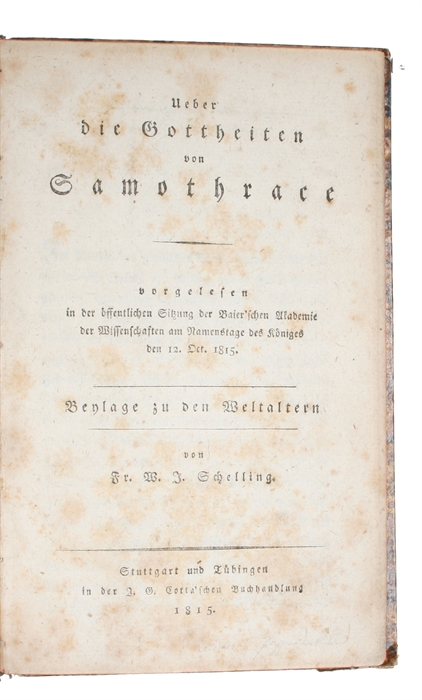SHELLING'S POSITIVE PHILOSOPHY OF MYTHOLOGY
SCHELLING, FR. W. J.
Ueber die Gottheiten von Samothrace, vorgelesen in der offentlichen Sitzung der Baier'schen Akademie der Wissenschaften am Namenstage des Königes den 12. Oct. 1815. Beylage zu den Weltaltern.
Stuttgart und Tübingen, 1815. 8vo. Cont. marbled cardboardbinding w. handwritten paper title to spine. A bit of wear to extremities. Internally some brownspotting. 117, (1, -Nachschrift), (6, Druckfehler) pp.
First edition of Schelling's "The Deities of Samothrace", which constitutes his earliest printed contribution to the mythic tradition.
Schelling accepts Hegel's conception of the absolute as that which is finite to the extent that it becomes nothing but negative relation to itself, and as such, for Schelling, this becomes a way of constructing a negative system of philosophy. This system explains the logic of change within a world that is subject to explanation, but it cannot explain why there is a world that is changing in the first place. Thus, Schelling sets out to explain the historical and ontological actuality of the world, and it is this attempt that leads him to his philosophical mythology and theology. For Schelling, the treatment of mythology and religion becomes the positive complement to the negative speculative philosophy.
The work was supposed to be a part of the great work that Schelling planned for years "Die Weltalter" ("The Ages of the World"); of this, however, he only ever wrote a small portion and published even less. According to Schelling, this work is meant as both an introduction and an transition to the rest of this planned cyclus of works. "Nicht an sich, nur der Intention des Verfassers nach Baylage eines andern Werks, ist sie zuglaich Anfang und Uebergang zu mehreren andern, deren Absicht ist, das eigentliche Ursystem der Menschheit, nach wissenschaftlicher Entwickelung, wo möglich auf geschichtlichem Weg, aus langer Verdunkelung an's Licht zu bringen." (Nachschrift).
Along with J.G. Fichte and Hegel, Schelling ranks as the most influential thinker of German Idealism. He stands in the centre of this most important and influential of philosophical traditions, and he continues to be of the utmost importance to the development of continental philosophy to this day.
Order-nr.: 36179


